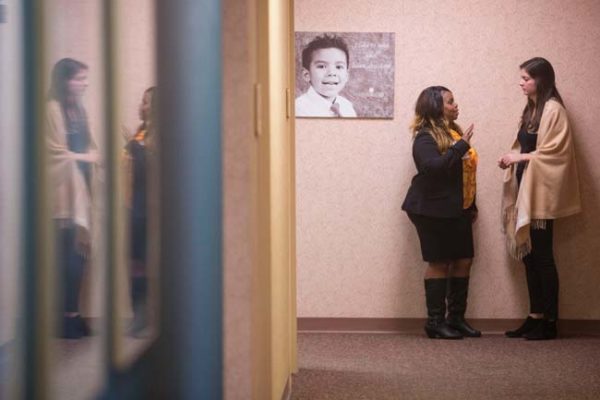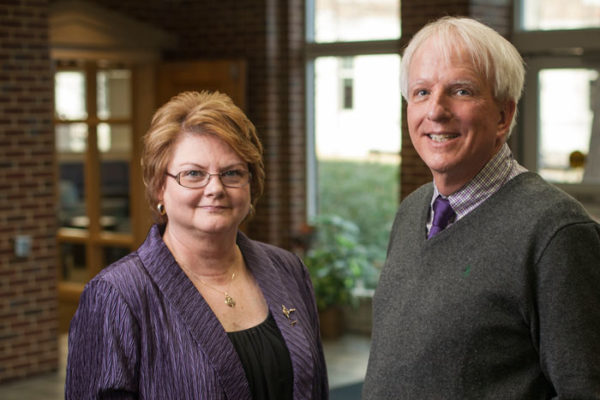Scholarly Works Soar: Nursing Practice Reaches New Heights
Curiosity, critical thinking and continuous learning are requirements for successful nursing students and faculty alike. The Vanderbilt University School of Nursing (VUSN) recently launched its Scholarly Practice Program, which empowers non-tenure track faculty to seek answers for their clinical practice.
“Our faculty are extremely talented professionals, each focused on their individual areas of interest. This program establishes a formal process to further grow and sustain scholarship—scholarship that we hope will profoundly advance nursing practice on the local, regional, national and even international levels,” said Linda Norman, DSN, RN, Valere Menefee Potter Professor of Nursing and Dean of VUSN.
“Though it’s not a requirement, it’s worth noting that all the funded projects for this first round are being conducted by faculty who have earned a DNP. It’s just one example of how the DNP education can open new avenues,” added Norman.
In addition to the thriving research efforts of the tenured and tenure track faculty, the leadership team wanted to develop the Scholarly Practice Program that would provide mentorship and support to non-tenured faculty to further develop their contribution to evidence-based practice.

Visiting professor Ruth Kleinpell guides faculty throughout the scholarly practice process. Photo by Anne Rayner.
“The hallmark of our program is identifying and supporting sustained projects that will have a documented impact. We know our faculty are doing cutting edge, interesting and innovative things, and we can now propel them forward,” said Senior Associate Dean for Research Ann Minnick, PhD, RN.
An important part of the structure is the support provided by Ruth Kleinpell, PhD, APRN-BC, RN, visiting professor, who also serves as director of the Center for Clinical Research and Scholarship Program at Rush University School of Nursing since 2007. Kleinpell is known for her own work on outcomes of APRN practice, discharge planning and telehealth.
Kleinpell serves as the director of the Scholarly Practice Program at Vanderbilt to guide and support faculty, starting with application guidance through evaluating the project—and every stage in between.
“Most faculty have experience with publishing or doing a clinical project based on opportunities that arise. They have the best intentions of moving forward, but often don’t have dedicated time to do it,” said Kleinpell. “Now they can have dedicated faculty support time to pursue their scholarly work. The non-tenure track faculty are ideal to do this work. They have a unique opportunity to partner with clinical sites because they are already there with students or with faculty practice.”
“Clinical scholarship is investigating real work, daily clinical programs and gaining solutions,” said Kleinpell. “Scholarship is not formal research, but it provides a mechanism to evaluate impact. The projects can result in publications, presentations, opportunity for funding for clinical projects or opportunities to showcase innovative health care solutions.”
The Scholarly Practice Program is funded through the Dean’s Faculty Development Fund and accepts applications on a rolling basis. In this inaugural round, six scholarly projects were funded.
Patient Communication
Ginny Moore, Women’s Health Interim Specialty Director, is conducting a project to promote effective patient communication among vulnerable women in Nashville, thanks to the Scholarly Practice Program.
“There is a lot of information available to guide providers in how to communicate with patients, but there’s a paucity of information on how to help patients have more effective communication with their providers,” said Moore, DNP, WHNP-BC.
Her project explores how to help women learn more about the best questions to ask health care providers, be encouraged to ask more questions during health care visits, and, ultimately, become more confident in patient-provider interactions.

Ginny Moore is looking for ways to empower disenfranchised women to get higher quality information from their health care providers to improve outcomes. Photo by Susan Urmy.
Moore led a similar project with Magdalene, a residential program for women who have survived prostitution, trafficking and addiction, as part of her own DNP capstone project. The Scholarly Practice Program is allowing her some time away from teaching to expand her work to a new level with The Next Door, an organization which provides residential transition and treatment for incarcerated women with co-occurring disorders. The organization recently doubled its resident capacity, so the timing is ideal.
“If one of the women, or anyone, is leaving a provider-patient interaction without getting thorough information, she is leaving the experience unsatisfied. Even follow-up phone calls for clarification are hard to make happen for these women and can add more confusion,” said Moore. She added that there is a direct correlation between effective patient communication and increased patient satisfaction and positive health outcomes.
Moore’s project involves one-on-one coaching and role playing that builds on provider encounters to find ways to better engage the provider. Each woman receives an individualized notebook to chronicle her lessons, write down medications and have questions ready to ask at her next health care appointment. So far, the notebooks have ended up being like security blankets for many of the women.
“I’m really excited to continue and expand this work,” said Moore. “Working with the women gives me an opportunity to expand my initial work and, as the project moves along, there will be opportunities for our students as well.”
Developing Competencies for ENP Practice
Jennifer Wilbeck, DNP, ACNP-BC, FNP-BC, VUSN’s Emergency Nurse Practitioner Specialty Director, is using the Scholarly Practice Program support to further contribute to development of the competencies for the American Academy of Emergency Nurse Practitioners (AAENP). This is the first and only organization created to brand and promote this crucial subspecialty area and ensure its continuing contributions.

Jennifer Wilbeck has helped create a new national organization to promote the role of Emergency Nurse Practitioners among key health care stakeholders. Photo by Susan Urmy.
The group’s specific objectives encompass diverse aspects of emergency care: establishing guidelines for quality health care, encouraging continuing clinical education, fostering training and education for all nursing students, promoting research, and representing clinicians within professional health organizations and academic institutions.
“More and more people are seeking primary health care in the emergency department. The health care system is flooded, and the safety net is the hospital emergency department. The ENP is uniquely prepared to help patients of all ages and across acuity levels,” said Wilbeck. “You may be treating someone who has been undergoing outpatient chemotherapy, and now has overwhelming sepsis, and the very next patient you encounter is a child who fell off the monkey bars. The next patient might be a suicidal person or someone having a heart attack.”
Only about 5 percent, or roughly 9,000 of nurse practitioners in the U.S., are ENPs, and there are only eight master’s-level academic programs focused on emergency care. Yet, according to Wilbeck, emergency nurse practitioners can be employed in geographic areas that are unable to recruit or maintain physician attention—such as rural locations.
“The AAENP exists to support those ENPs in varied practice settings. We are a specialty organization focused on developing a unified voice for emergency nurse practitioners, much like physicians have an emergency physicians organization,” said Wilbeck, who was elected chair of the new association.
Her scholarly practice will benefit the organization by revising the scope and standards of ENP practice. She and the board of directors are participating in conferences and actively recruiting membership while developing a geographic membership infrastructure. Interest in membership has already been expressed from as far away as Australia, New Zealand and in South Korea.
Measuring Provider Competencies
Vanderbilt nurse-midwifery faculty member Sharon Holley, DNP (VUSN ‘10), CNM, aims to determine the most meaningful and specific ways to measure the competency of nurse-midwives. While the Ongoing Professional Practice Evaluation and the Focused Professional Practice Evaluation (FPPE) exist for health providers in Joint Commission-accredited hospitals, Holley wants to explore how she can improve the process even further.

Sharon Holley is helping define nurse-midwifery competencies in an effort to standardize care and improve outcomes. Photo by Susan Urmy.
“The challenge is that the Joint Commission is not very specific on how to measure competency among this group of providers, midwifery or APRNS generally, so each practice, each labor and delivery department, is left to its own definition of what it means to be competent,” said Holley.
This is a real-world issue that Holley knows well in her role as co-director of the Vanderbilt Nurse Midwives, the thriving VUSN faculty practice with more than 23 nurse-midwives who deliver more than 1,200 babies each year.
“In my case as an administrator, what is the best mechanism to assess competency? Do I only use the numbers that I have for my nurse-midwives? Do I use the six OPPE parameters? Do I factor in patient feedback?” asked Holley. “The other challenge is that we have certain procedures that we don’t do very often, but are responsible for knowing, like shoulder dystocia or breech birth. How do we measure competency of those?”
Holley and Christian Ketel, DNP (VUSN’ 14), RN, have laid the groundwork for this scholarly project with a recent article in the Journal of Midwifery & Women’s Health (August 2014). The focus of her scholarly practice project is to identify which metrics might help answer the competency question and develop a tool kit that any nurse-midwifery practice can use with more specific guidelines.
“This work is meant to address quality issues and improve patient outcomes,” said Holley. “It’s another great opportunity for me to use my DNP education to quickly improve practice, and I’m really excited that our dean supports this kind of work.”
Helping Healers in Kenya

Carol Ziegler is looking at ways to support Nandi traditional healers in Kenya by identifying obstacles and developing ways to support them on their own terms. Photo by Susan Urmy.
Carol Ziegler, DNP (VUSN ‘12), MSN (VUSN ‘06), NP-C, RD, brings a variety of experience to her roles of teaching in the Family Nurse Practitioner Program and championing the school’s global health offerings for students. She will further investigate the role and cultural healing practices of Nandi traditional healers in Mateket Village, a rural community in Western Kenya.
“There is virtually no affordable, quality primary care in the region. The district nurse comes out twice a year to give vaccinations, but the residents have no support for major health issues like alcoholism, malaria and hypertension,” said Ziegler. “They rely almost exclusively on the local healers—some are midwives, some are herbalists and some are both.”
Ziegler has a professional and personal connection with this 700-person, agriculturally based community. Mateket is her husband Magut’s home village, where his mother, sisters and extended family reside in one of the few brick homes in the mostly mud hut community.
Familial relationships have allowed Ziegler to gain a deeper trust with those she will be interviewing to identify community needs, health care workforce issues and educational needs among the healers.
Healers have some powerful outcomes, but their way of life is being threatened, according to Ziegler. For instance, their access to medicinal plants is shrinking due to deforestation and government-imposed licensing rules.
After combing through focus group files from a previous visit to Kenya as part of her own DNP project, she will conduct a gap analysis and develop a community needs assessment with local Kenyan partners for use with additional on-site interviews in December 2015. She will tease out the major health needs and develop targeted, measured community interventions that will be developed in collaboration with local partners. She hopes to develop culturally appropriate, accessible and quality community-led initiatives for the people of Mateket.
“The School of Nursing leadership is very invested in global health, and supporting a faculty member like me in this way, shows it,” said Ziegler.







